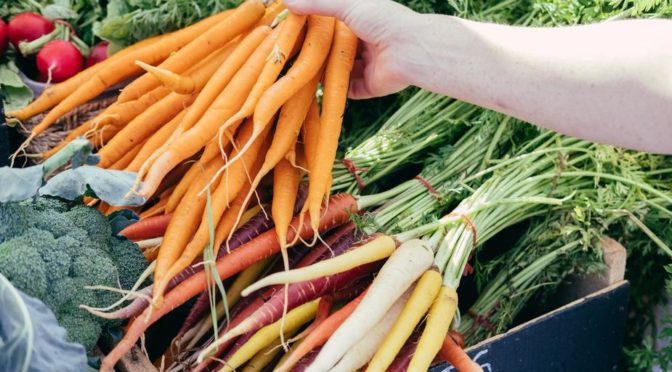Tips on Saving on the Cost of (Good) Groceries
This post was updated on May 7, 2020.
Welcome readers. Today we wanted to update one of our most popular posts on saving money at the grocery store.
With the rise of COVID-19, grocery stores have become one of the only places we can go to, making it important to spend the money we have wisely. We have seen (and experienced) a panic rush of stocking up on food and other essentials over the last few weeks and we wanted to bring you a post that helps address how you can buy good food for less.
A surprising fact that we learned on the job is that so many of our clients are concerned about the price of groceries. This is a big topic for many people and after all of the conversations with clients, we can understand why. Food is a big-ticket item on many household budgets.
From a young family attempting to stay in budget while feeding growing kids to retirees who worry about how many times they can eat out per week, food is on everyone’s mind. The daily drip of food costs impact everyone’s wallet and can be a source of stress for many people.
In that spirit of concern for the price of food and groceries, our owner and CFP(R) Quinn Arnold would like to offer a few tips on how he and his wife have managed to save money at the grocery store without sacrificing the quality of what they eat.
Set grocery standards
As you would set standards in other aspects of your life, set some standards for yourself and your family at the grocery store. Setting standards doesn’t mean that you have to select the cheapest option on the shelf. Always opting for the least expensive item is something that I find to be an unhealthy aspect of our culture. Although I do love a good deal, fixating on that saving doesn’t help me make the best choice. Our guiding principles at the Arnold house are:
- Eat a lot of fruits and veggies. We belong to community-supported agriculture or CSA, and really enjoy the delicious vegetables and occasional fruits they provide. This membership does require us to be more thoughtful in our meal planning in order to use all the vegetables we get, but it has changed how we eat as a family. Plus, you get a lot of produce for the price of a CSA share, it’s not as expensive as you might think!
- Consider generic or store-brand items. I remember the stigma attached to generic foods when I was a kid in the 1980s (hello black and white box of corn flakes!), and I wouldn’t have guessed then that I’d be an avowed store-brand buyer now. Quality has come a long way, and though there are some items I pay a little more to get a name-brand, I like this option to save money.
- Make the meal. Although my wife and I are not hobbyist cooks, we do enjoy the satisfaction you get from making a good meal from scratch as opposed to reheating prepared food. This has become much more challenging with little kids in the house, but we’ve developed ways to keep our heads on straight and still cook 5-7 dinners a week. This takes a lot of practice, a willingness to experiment, a dedicated spirit, and patience with each other. But the alternatives, like eating out all the time and eating a lot of prepackaged stuff, don’t sound so good, either.
How to save on the cost of good groceries
Making dinners for a busy family 5 to 7 times a week with healthy, fresh ingredients is definitely time-consuming and could be costly. Here are my tips for keeping the financial pressure under control:
- Always shop with a list. This should make the experience faster and less stressful at the store. My mom, God bless her, used to wander around the grocery store for hours trying to figure out what she needed. I can do a week’s worth of shopping in an hour. The cost-saving comes from buying only what you need and making sure you’re not buying extra or unnecessary items. Don’t like shopping with lists? Give it a try for three weeks out of the month, and then feel free to go crazy for one shop each month. I think you’ll come around.
- Keep a list of items you need at home. This is a huge time saver, and easy to do whether you use a paper list or your smartphone for shopping. When you need to actually plan out your week of meals, having this running list already going will shorten the task.
- Don’t shop hungry and leave the kids at home. Easier said than done some days, and I understand. Just know that being hungry and distracted leads to poor buying decisions, and guess what, the store likes it when you make poor buying decisions!
- Stock up on sale items, but only if you use them. We don’t go to Costco (partly because we don’t have the storage room for huge quantities of items), but it’s also because I strongly believe that having lots of unused food, which can go bad, is not a good deal at all.
- Eat leftovers for lunch. We ALWAYS make enough for leftovers, and as both of our skills in the kitchen have improved, we don’t consider leftovers to be a step down anymore. I’m always surprised by people who buy their lunches, especially if they ate a meal at home the night before.
- Avoid prepackaged foods when possible. Meal kits and pre-assembled ingredients are convenient, and I guess could be a good starting point for you if you’ve never cooked at home. But they’re more expensive than buying and washing/cutting/cooking the items yourself.
- Don’t be afraid of the freezer section for veggies, fruit, and seafood. Foods that are out of season, like blueberries in December, are cheaper and pretty good when frozen. For seafood, all of the stuff we have in Iowa is previously frozen, so why not just get it from the freezer case to begin with?
- Use the club site or app for online shopping. I’m a big fan of Hy-Vee’s “Aisles Online” system, and I use their rewards program all the time to save on the cost of gas. I chuckle now because I held out for a couple of years when they first introduced the rewards program, thinking they’d be pestering me all the time with spam or junk mail. Surprisingly, none of that happens, and now I save $5-15 a week on gas because of the rewards.
Why Does It Matter?
Making fresh, healthy food and trying to save money while doing it is not always easy. But by creating a plan and sticking to it, we are able to make it work, Of course, we still eat out occasionally as a family and pick up a pizza when we need to but it isn’t a mainstay in our house.
When it comes to grocery shopping and cooking, making a good effort goes a long way. My wife and I, while far from top chefs, have learned to enjoy cooking and trying out new recipes for our family. When you give it your best shot, remain dedicated, and allow yourself to be flexible, you will find that it isn’t as daunting as it looks.
If you’ve wondered why you’re spending so much on food (and maybe not enjoying the meals), I encourage you to try a few of these tips, and let me know how it goes!
Arnold & Mote Can Help
Household budgeting is among the most important ways to track and understand spending habits. Uncovering what those habits are and why they are there can lead you to make positive changes in your financial life.
We are passionate about helping families spend their money in a way that reflects their goals, values, and priorities. Interested to see how that could work for you? Schedule a time to talk with us. We can’t wait to hear from you.


